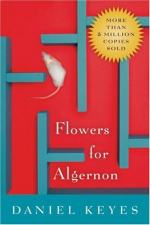|
This section contains 2,280 words (approx. 6 pages at 400 words per page) |

|
F. Brett Cox is an assistant professor of English at Gordon College in Barnesville, Georgia. In the following essay, he explores how Flowers for Algernon both works as and transcends science fiction, particularly in its exploration of themes of alienation and humanity.
Like Harper Lee and J. D. Salinger, Daniel Keyes is an author whose reputation rests on a single remarkable novel. Keyes' Flowers for Algernon, like Lee's To Kill a Mockingbird and Salinger's The Catcher in the Rye, is a powerful story of alienation, of an individual who is at odds with his society and who struggles to have satisfactory relationships with others. Unlike Lee's and Salinger's novels, however, Flowers for Algernon is also a work of science fiction: the type of science fiction, according to Saturday Review critic Mark R. Hillegas, that "deals with moral, social, psychological, theological, or philosophical problems imagined as resulting from...
|
This section contains 2,280 words (approx. 6 pages at 400 words per page) |

|




